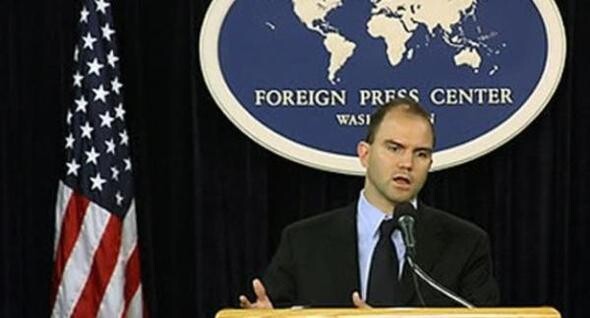hankyoreh
Links to other country sites 다른 나라 사이트 링크
US in deliberations with South Korea, Japan to strengthen missile defense

The US government openly admitted that it is in deliberations with South Korea and Japan about strengthening their missile defense ability. In the view of China, US-led cooperation on missile defense is the first step toward a military alliance among the three countries. As such, this declaration, along with remarks made the previous day by South Korean President Park Geun-hye about reviewing the possibility of deploying the THAAD missile defense system in South Korea, are likely to spark controversy.
When asked about the roles of South Korea and Japan in tackling the issue of North Korea’s nuclear program, Deputy National Security Advisor Ben Rhodes said that the US is deliberating with the two countries about strengthening their missile defense ability, which he said is directly connected with protecting Americans from the threat posed by North Korea. Rhodes made the remarks at an event in Washington, D.C., on Jan. 13 at which he explained the significance of US President Barack Obama’s State of the Union address to foreign correspondents.
The US is collaborating with these countries because they need to demonstrate their ability to make a joint response to North Korea’s behavior, Rhodes said, adding that they should also carry out joint military exercises on a bilateral basis.
When Rhodes made these comments, it was unclear whether he had in mind the possible deployment in South Korea of THAAD (Terminal High Altitude Area Defense), the interceptors that constitute the key method of missile defense.
But since US officials have repeatedly proposed deploying THAAD in South Korea recently and Rhodes made the remarks immediately after President Park’s first public comments about THAAD, this remains within the realm of possibility.
Even if Rhodes was not talking about THAAD, though, his remarks could further destabilize Northeast Asia, which is already reeling from North Korea’s recent nuclear test. This is especially the case since China has strongly opposed US-led efforts to set up a missile defense system in South Korea and Japan, which it regards as being intended as a military approach to countering its own rise.
Rhodes’ remarks appear to be part of a strategy of using military means to strong-arm China into signing up for tougher sanctions against North Korea. “We believe that China can apply additional pressure, should apply additional pressure,” he emphasized. He also announced that the US would work with South Korea and Japan to impose additional sanctions on North Korea.
Rhodes also touched on why Obama did not mention North Korea in his State of the Union Address on Jan. 12.
“If there is one thing I know about the leader of North Korea, it is that he likes attention and probably would like nothing more than the president to spend a lot of time to talk about it in the State of the Union,” Rhodes said. “We didn’t particularly feel compelled to give him that attention.”
This suggests that Obama deliberately snubbed Pyongyang to show that the US will not fall for the North’s attention-seeking behavior.
US Secretary of State John Kerry unveiled the US’s foreign policy agenda for 2016 in an address at the National Defense University in Washington on Wednesday, but he also made no mention of North Korea or the North Korean nuclear issue.
By Yi Yong-in, Washington correspondent, and Lee Je-hun, staff reporter
Please direct questions or comments to [english@hani.co.kr]

Editorial・opinion
![[Column] Park Geun-hye déjà vu in Yoon Suk-yeol [Column] Park Geun-hye déjà vu in Yoon Suk-yeol](https://flexible.img.hani.co.kr/flexible/normal/500/300/imgdb/original/2024/0424/651713945113788.jpg) [Column] Park Geun-hye déjà vu in Yoon Suk-yeol
[Column] Park Geun-hye déjà vu in Yoon Suk-yeol![[Editorial] New weight of N. Korea’s nuclear threats makes dialogue all the more urgent [Editorial] New weight of N. Korea’s nuclear threats makes dialogue all the more urgent](https://flexible.img.hani.co.kr/flexible/normal/500/300/imgdb/original/2024/0424/7317139454662664.jpg) [Editorial] New weight of N. Korea’s nuclear threats makes dialogue all the more urgent
[Editorial] New weight of N. Korea’s nuclear threats makes dialogue all the more urgent- [Guest essay] The real reason Korea’s new right wants to dub Rhee a founding father
- [Column] ‘Choson’: Is it time we start referring to N. Korea in its own terms?
- [Editorial] Japan’s rewriting of history with Korea has gone too far
- [Column] The president’s questionable capacity for dialogue
- [Column] Are chaebol firms just pizza pies for families to divvy up as they please?
- [Column] Has Korea, too, crossed the Rubicon on China?
- [Correspondent’s column] In Japan’s alliance with US, echoes of its past alliances with UK
- [Editorial] Does Yoon think the Korean public is wrong?
Most viewed articles
- 1‘We must say no’: Seoul defense chief on Korean, USFK involvement in hypothetical Taiwan crisis
- 2N. Korean delegation’s trip to Iran shows how Pyongyang is leveraging ties with Moscow
- 3‘Weddingflation’ breaks the bank for Korean couples-to-be
- 4[Reportage] On US campuses, student risk arrest as they call for divestment from Israel
- 5Amnesty notes ‘erosion’ of freedom of expression in Korea in annual human rights report
- 6[Column] Park Geun-hye déjà vu in Yoon Suk-yeol
- 7Korea sees more deaths than births for 52nd consecutive month in February
- 8[Editorial] New weight of N. Korea’s nuclear threats makes dialogue all the more urgent
- 9Will NewJeans end up collateral damage in internal feud at K-pop juggernaut Hybe?
- 10[Guest essay] The real reason Korea’s new right wants to dub Rhee a founding father